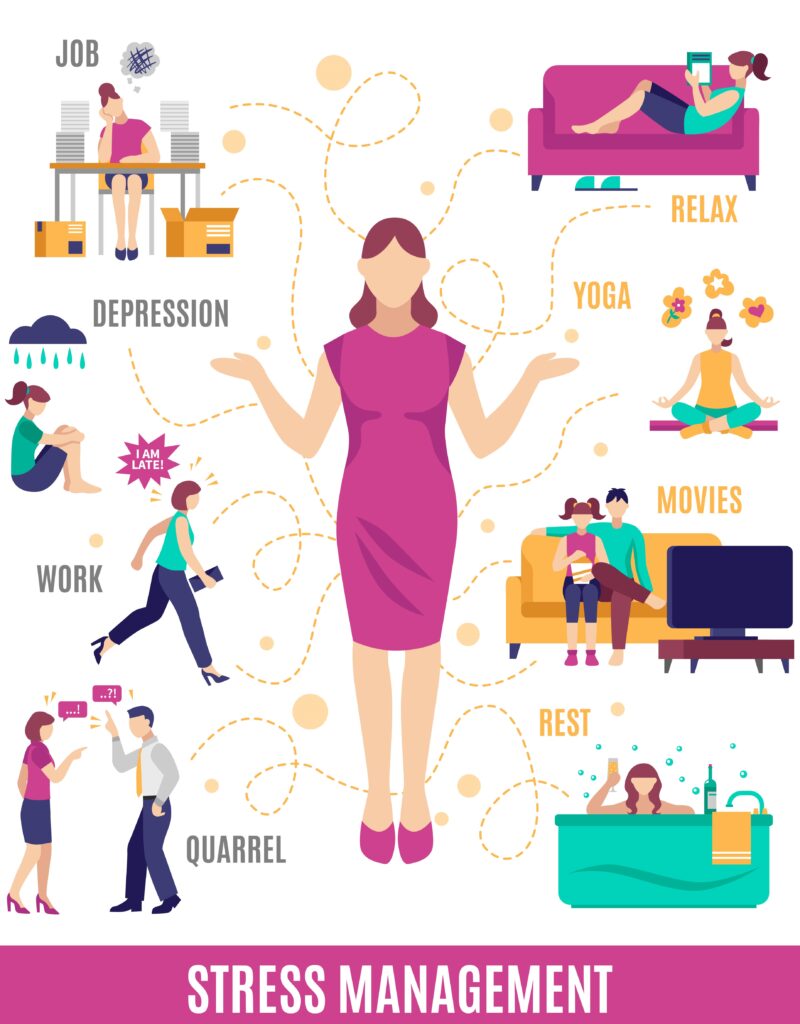Understanding and Managing Stress
The concept of stress in the modern sense was first extensively studied by Hans Selye in the 1930s. Selye, an endocrinologist, introduced the term “stress” to describe the body’s non-specific response to any demand for change. His research led to the development of the General Adaptation Syndrome (GAS) model, which outlines the stages of stress response: alarm, resistance, and exhaustion.
Before Selye’s work, stress was primarily associated with physical strain and engineering concepts. Over time, the understanding of stress has evolved to encompass psychological and social dimensions, recognizing its significant impact on mental health and daily functioning. Today, stress management is a vital area of study, with various strategies developed to help individuals cope with stress effectively.
Definition
Stress is the body’s reaction to any change that requires an adjustment or response. The body reacts to these changes with physical, mental, and emotional responses. Stress can be positive, keeping us alert and ready to avoid danger, but it becomes negative when a person faces continuous challenges without relief or relaxation.
Stress is an inevitable experience that everyone encounters at some point. It is defined as the body’s reaction to any demand or challenge. While it is a normal part of life, excessive stress can lead to significant health problems and adversely affect overall well-being. This article delves into the concept of stress, identifying its types, mechanisms, causes, and disadvantages. It also offers strategies for managing stress, with a particular focus on the workplace. By understanding these elements, individuals can better manage stress and mitigate its negative impacts.
Types of Stress
- Acute Stress.
- Chronic Stress.
- Episodic Acute Stress.
- Traumatic Stress.

- Acute Stress: This is the most common form of stress. It is short-term and the most manageable form of stress, often triggered by daily demands and pressures.
- Chronic Stress: This type of stress is persistent and can lead to severe health issues if not managed properly. It is often related to ongoing situations such as a stressful job or financial problems.
- Episodic Acute Stress: This occurs when someone frequently experiences acute stress. This can result in a life of ongoing chaos and crisis.
- Traumatic Stress: This is a severe stress reaction to a traumatic event such as a major accident, natural disaster, or assault.

How Stress Occurs
Stress occurs when the body perceives a threat and activates the fight-or-flight response. This response involves a series of physiological changes, including the release of stress hormones like cortisol and adrenaline. These changes prepare the body to deal with the perceived threat.
Causes of Stress
Stress can be caused by a variety of factors, including:
- Work-related pressures: High workload, tight deadlines, job insecurity.
- Life changes: Moving house, getting married, having a baby.
- Financial issues: Debt, sudden expenses.
- Health concerns: Chronic illness, injury.
- Relationship problems: Conflicts with family or friends.
Disadvantages of Stress
Unmanaged stress can have several negative effects, such as:
- Physical Health Problems: Headaches, high blood pressure, heart disease, obesity, diabetes.
- Mental Health Issues: Anxiety, depression, panic attacks.
- Decreased Performance: Reduced productivity, poor decision-making, errors.
- Impact on Relationships: Strain on personal and professional relationships.

Stress Management Strategies
Managing stress involves several techniques and lifestyle changes, including:
1. Exercise: Regular physical activity helps reduce stress hormones and improves mood.
2. Healthy Diet: Eating a balanced diet can improve overall health and stress resilience.
3. Sleep: Ensuring adequate sleep helps the body recover and handle stress better.
4. Mindfulness and Relaxation Techniques: Practices such as meditation, yoga, and deep breathing exercises can help calm the mind.
5. Time Management: Prioritizing tasks and managing time effectively can reduce stress.
6. Support Systems: Talking to friends, family, or professionals can provide emotional support and practical advice.

Reducing Stress at the Workplace
1. Organize Your Work Space: A clutter-free workspace can reduce stress.
2. Set Realistic Goals: Break tasks into manageable steps and set achievable deadlines.
3. Take Breaks: Regular breaks can help maintain productivity and reduce stress.
4. Communicate Effectively: Clear communication with colleagues and superiors can prevent misunderstandings and reduce stress.
5. Seek Professional Help: If workplace stress becomes overwhelming, seeking help from a mental health professional or counsellor can be beneficial.
Conclusion
Stress is an inevitable part of life, but understanding its causes, types, and effects can help manage it effectively. By adopting healthy lifestyle habits and stress management techniques, individuals can reduce the negative impact of stress and improve their overall well-being. In the workplace, fostering a supportive environment and implementing practical strategies can significantly reduce stress levels and enhance productivity.


